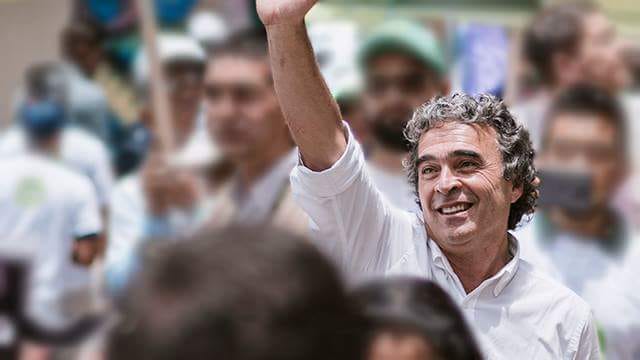
Photo: sergiofajardo.co
What was the impact of polling on the first round of the presidential elections? Could Fajardo have beaten Petro if he had not been so far behind in the polls? We find out more.
For both Iván Duque and Gustavo Petro, last May 27 was a good day. Somewhat surprisingly, it was also a good day for Colombia’s typically unreliable pollsters, who in the first round of Colombia’s 2018 presidential elections correctly forecast a run-off between Duque and Petro as well as the lacklustre performances of Germán Vargas Lleras and Humberto de la Calle.
The results will come as a great relief to Colombian polling companies following the 2016 peace plebiscite when pollsters predicted a 60% victory for the ‘yes’ campaign, which eventually received less than 50% of the vote.
This time round, the most notable discrepancy was an underestimation of Sergio Fajardo’s support. The former mayor of Medellín gained 23.7% of the overall vote after being placed at 14 to 18% in the final polls.
Hard luck for Fajardo?
Fajardo, who finished less than 300,000 votes behind Petro, may wonder whether he would still be battling for the presidency had there not been a ban on publishing opinion surveys after May 21. Indeed, during the last few weeks of campaigning, the polls were showing a sharp rise in Fajardo’s popularity which evidently continued into the final week. In fact just two days prior to voting, Cesar Caballero – director-general of polling company Cifras & Conceptos – told The Bogotá Post that support for Fajardo was increasing at a faster rate than for any other candidate.
Related: Presidential candidates: Sergio Fajardo
Eugenie Richard, a researcher from the Department of Government Finances and International Relations of the Universidad Externado in Bogotá, believes the ban on polls definitely influenced the outcome of the first round. According to Richard, “more people would have voted for Fajardo if they thought he had a better chance of winning, instead of tactically voting to limit the gains of another candidate.” Other factors, she explains, such as Uribe’s endorsement of Duque, Petro’s rising popularity and the polarisation of the electoral debate, cost Fajardo his initial lead in the polls. But the question remains as to whether his late comeback would have been enough to carry him into the second round, had his increasing popularity been publicly documented up until the day of the election.
The polls get it right
On the whole, the results of the first round suggest that polling companies have taken a positive step towards mitigating several methodological challenges which have previously caused headaches for statisticians attempting to measure Colombian electoral opinion.
A crucial issue is the lack of an up-to-date state census (the last was conducted in 2005), leaving pollsters with an incomplete and outdated understanding of how Colombia’s population is composed, which greatly complicates the task of taking a representative sample. Colombia is also an extremely diverse country with pronounced socioeconomic inequalities, for example between citizens living in urban centres and those living in poorer rural areas and in the urban periphery. Other divisions stem from how individuals, communities and regions have experienced armed conflict – an issue which strongly affects voter intention.
To capture these stark divisions, surveys must span a vast geographical area and include hard-to-access rural areas. Rural communities are particularly important to reach, as many have suffered from high levels of armed conflict in comparison to urban citizens. Yet the difficulty of reaching certain areas of the country means that many surveys often focus on the most populous cities, sampling between 800 and 1,000 people via telephone and thus failing to capture voter intentions in rural areas where access to landlines is limited.
An additional problem for pollsters, according to Caballero, is that Colombian political parties are “weak”. As he explains, “50% of Colombians have no party affiliation, and the other 50% are split between seven parties”, he said. “It’s not like the US or UK where there are two clear sides”.
Electoral fraud and patronage – particularly influential in poorer areas – also complicate the work of polling companies, as studies are designed to reflect voter opinion and not to measure a party’s capacity to influence voting through bribery, favours or other inducements.
Richard believes that Sunday’s results show that polling companies, sensing that another failure would destroy any faith the public had left in their work, made rigorous efforts to broaden the range of citizens interviewed, particularly in rural areas, which ultimately entailed more accurate results.
Second round
Attention now turns to the highly polarised second round of voting on June 17, a big question being whether Fajardo’s voters will abstain in large numbers or rather support whichever candidate they consider the lesser of two evils. Seeing as Fajardo has already announced his intention to cast a blank vote in the second round, opinion polls will likely be a fundamental resource for voters when deciding who to vote for, or whether to vote at all.





